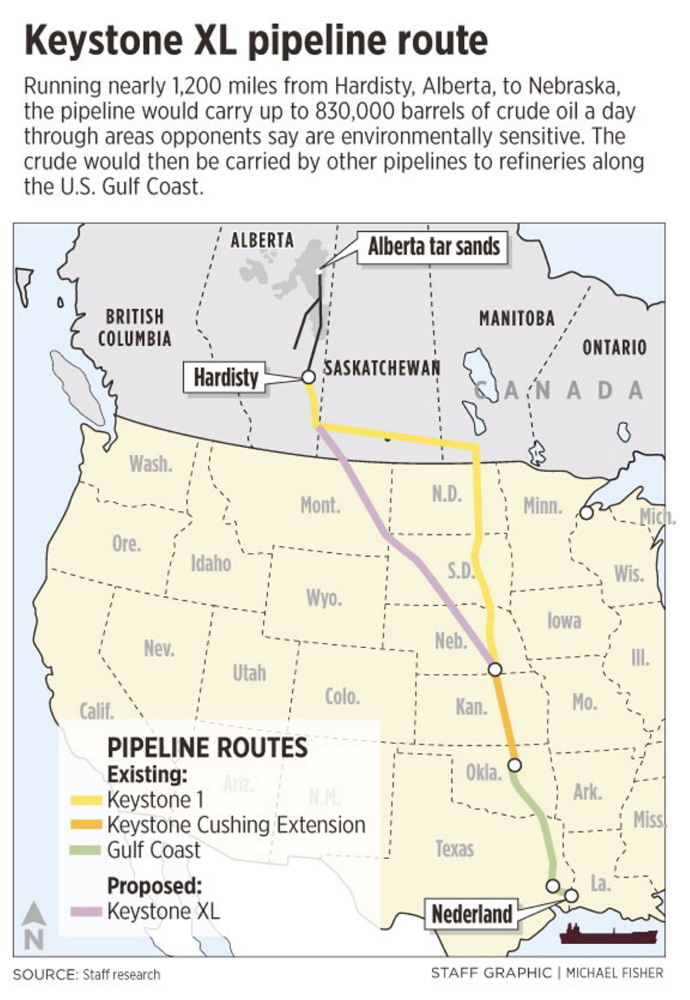Maine Sen. Angus King joined most Senate Democrats in blocking a bill to allow construction of the Keystone XL pipeline, casting a pivotal vote Tuesday with implications for the national climate change debate and potentially for one Democratic senator’s political future.
King, an independent who caucuses with the Democrats, was courted as the possible 60th vote needed to advance a bill to bypass the Obama administration’s review of the controversial pipeline project. The bill fell one vote short of advancing, 59-41, in a vote that also could have cost Sen. Mary Landrieu her seat. The Louisiana Democrat is facing a tough runoff election in a state where oil refining is big business.
Maine Sen. Susan Collins voted with all 44 other Republicans to allow construction to proceed, as expected. But King, after being in the national spotlight for several days, ended speculation Tuesday morning before the vote, even as he expressed frustration with the slow pace of the State Department review, which is required because the pipeline would cross the U.S. border.
“Congress is not – nor should it be – in the business of legislating the approval or disapproval of a construction project,” King said in a written statement. “And while I am frustrated that the president has refused to make a decision on the future of the pipeline, I don’t believe that short-circuiting the process to circumvent his administration is in the best interest of the American people. I urge the president to make a decision soon, and, if he doesn’t, I look forward to working with Congress to put a time frame on this decision.”
Republicans are already promising to revive the issue in 2015 when they control both chambers of Congress.
“It’s just common sense,” Sen. Mitch McConnell, the Kentucky Republican scheduled to become the next Senate majority leader, said before the vote. McConnell then vowed that if Tuesday’s vote did not go his side’s way, “a new majority will be taking this matter up and sending it to the president” next year.
White House spokesman Josh Earnest said Tuesday that Obama does not support the Senate bill, suggesting a possible veto of any legislation, The Associated Press reported.
As proposed, TransCanada’s proposed Keystone XL pipeline would have the capacity to carry up to 830,000 barrels of “oil sands” or “tar sands” crude oil from the Canadian province of Alberta to Nebraska. Once in the U.S. heartland, the Alberta crude oil would flow into other pipelines to be carried to refineries along the Gulf Coast or in the Midwest.
TransCanada and pipeline supporters say the project will create 9,000 construction jobs and indirectly support tens of thousands more, while reducing U.S. reliance on oil from the Middle East and other turbulent regions. Opponents question those job figures and claim that extraction of tar sands oil causes more on-the-ground environmental destruction while generating more greenhouse gas pollution. They also contend that the U.S. should invest in renewable energy – not more fossil fuel combustion – to combat climate change.
TransCanada has sought State Department approval for the 1,200-mile section of the pipeline that crosses the U.S.-Canada border, but the Obama administration, facing intense opposition from well-funded environmental groups and some landowners, has delayed any decision.
Tuesday’s vote highlighted the political dynamics of the pipeline debate.
Facing a runoff election against a Republican opponent, Landrieu has been at the forefront of the campaign to pass a bill that would benefit her state’s refineries, but is opposed by most members of her party. Landrieu and her supporters hoped Senate passage would help narrow the lead enjoyed by her opponent, Republican U.S. Rep. Bill Cassidy, and keep one more seat in Democratic hands when Republicans take control of the Senate next year.
In a passionate floor speech before the vote, Landrieu predicted “this product will move to these refineries” regardless of what happens on Capitol Hill. But passage of the bill will allow construction of a safer, state-of-the-art pipeline that she suggested was preferable to moving oil by rail or barge.
“This is for Americans, for American jobs to build an American middle class. And it will create 40,000 immediate jobs,” said Landrieu, chairman of the Senate Energy and Natural Resources Committee. “If the people in this Congress have not noticed, there are some long unemployment lines in some parts of this country.”
Without support from King or additional swing Democrats, however, the bill fell one vote short of the 60 needed to advance the measure under the Senate’s procedural rules.
Collins said it was “past time for the president to have made a decision,” and that blocking the pipeline will push the oil onto ships or railroad cars, creating other safety concerns.
“Canada has made clear it will develop this resource,” Collins said in a written statement. “I would much rather see our nation receive and refine the oil from our close ally than have it shipped overseas to Asia. Canada is our nation’s largest trading partner, and this pipeline, constructed at the highest safety standards, would create thousands of jobs in our two nations – both in building the pipeline and in the refining of crude oil, one reason why many labor unions support its construction.”
Maine’s senators are frequently courted as potential swing votes on closely divided issues.
In 2013, King opposed a non-binding budget amendment urging approval of the Keystone pipeline. He is a vocal critic of Republican resistance to addressing climate change – a focal point of pipeline opponents – because of the implications for Maine’s commercial fisheries and other natural resources industries. And the independent has called for an intensive federal environmental review of long-rumored proposals to move tar sands oil through an existing pipeline between Montreal and South Portland.
While the fate of the bill was hanging in the balance, King was pressured by both sides in the Keystone debate.
On the eve of the Senate vote, the American Petroleum Institute apparently sponsored automated telephone calls, or “robocalls,” to Maine voters saying, “It is time for the Obama administration and Congress to stop putting political interests ahead of what’s best for the nation. Please call Senator Angus King … and tell him to do the right thing and support the Keystone XL pipeline.”
An American Petroleum Institute spokesman declined to comment specifically on the calls, but said the industry trade group has “a broad ongoing national issue education campaign that is focused on the benefits of energy development, jobs and energy security, including benefits of approving the Keystone XL pipeline.”
Opponents of the pipeline also have been lobbying King, a former two-term governor who was heavily involved in development of wind power and other renewable energy in Maine.
Glen Brand, director of the Maine chapter of the Sierra Club, praised King’s decision to vote against the Senate bill.
“By saying ‘no’ to Keystone and dirty tar sands oil, Senator King is demonstrating much-needed leadership on climate (change) and environmental protection,” Brand said.
Send questions/comments to the editors.





Success. Please wait for the page to reload. If the page does not reload within 5 seconds, please refresh the page.
Enter your email and password to access comments.
Hi, to comment on stories you must . This profile is in addition to your subscription and website login.
Already have a commenting profile? .
Invalid username/password.
Please check your email to confirm and complete your registration.
Only subscribers are eligible to post comments. Please subscribe or login first for digital access. Here’s why.
Use the form below to reset your password. When you've submitted your account email, we will send an email with a reset code.